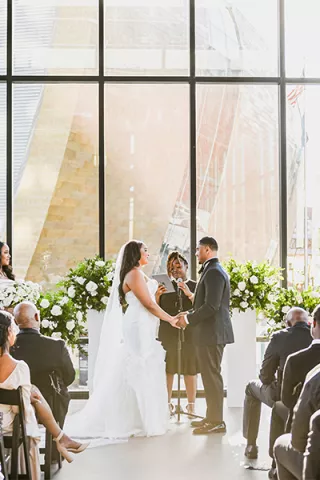There’s nothing like the stress of wedding planning to bring out a couples’ worst side. Unfortunately, most couples find themselves having more conflict during their engagement because of pressure from their families and friends, major decision making that is likely new to the relationship, and just having different opinions on what and who the wedding should involve.
While diving deep into a couples’ conflict pattern does involve couples therapy, there are important steps you can take at home without ever needing to see a therapist. If you find yourself fighting a lot now that you’re engaged, or constantly wondering what you’re doing wrong and why your partner doesn’t understand you, these five steps are for you.
1. Learn to Hear Your Partner & Practice Active Listening
Learn to actually hear your partner. We all think we’re great listeners, but truly hearing your partner is a skill that most don’t have. Think for a minute about what your brain is doing when your partner is talking to you, especially in an emotional situation. What are you actually thinking about while your partner is talking? Most often, you’re thinking of your response and planning your defense. Imagine how much of your partner’s communication you miss out on because of your own thinking. You miss out on actual words, tone, emotion, and nonverbal communication.
If you want to get better at hearing one another, so you can improve your understanding of one another, you can start by practicing “active listening” with non-emotional issues. Set a timer for 30 seconds to start, one partner talks, the other partner listens and repeats back what you heard him/her say. Then, switch it up so the talker is now the listener. This will feel awkward at first, but continue to practice it until you can implement this skill in more difficult conversations.
2. Ask Your Partner Questions for Better Understanding
I know this sounds like a no-brainer, but people love to assume in their relationships, and assuming leads to so many unnecessary mistakes in communication. Ask questions to truly understand how your partner is thinking and feeling. If you don’t understand your partner, ask for clarification. Here are some examples:
Q: I heard you say you were upset yesterday. I would like to know more about that. Please tell me why you were upset and what you were feeling.
Q: I feel like wedding planning is causing us to have conflict. I want to know what’s upsetting for you. It’s important for me to know how you’re feeling about this stress in our relationship.
3. Treat Your Partner the Way You Want to be Treated
Respond to your partner in good times and bad, the same way you want to be treated. The Golden Rule goes a long way in relationships! Focus on how you want your partner to feel after a conversation or conflict is over (i.e. I want my partner to feel loved, supported, and understood.), and then try your best to approach your communication in a way that will produce that feeling for him/her.
4. What Does Your Partner Need in Communication?
Get to know your partner’s needs when it comes to communication and conflict resolution. Does your partner need empathy and understanding (especially true for most women)? Or does your partner need help fixing a problem (especially true for most men)? Ask your partner (remember Tip #2!) what they need from you before the conversation starts, so you’ll know how to respond in the best way possible.
5. Don’t Take the Easy Way Out Because it’s More Comfortable
Changing patterns of communication and conflict in any relationship is difficult and it takes a lot of time, effort, and practice. It’s important to realize that making the right choice during a conflict cycle doesn’t mean it’s the easy choice. Doing things differently for the betterment of your relationship (especially if your partner isn’t participating) takes a lot of courage and vulnerability. Start small and use these five steps to see if you can make things better without the help of a therapist. If not, get someone to help you early on, so you can improve your relationship while it’s still doable!














